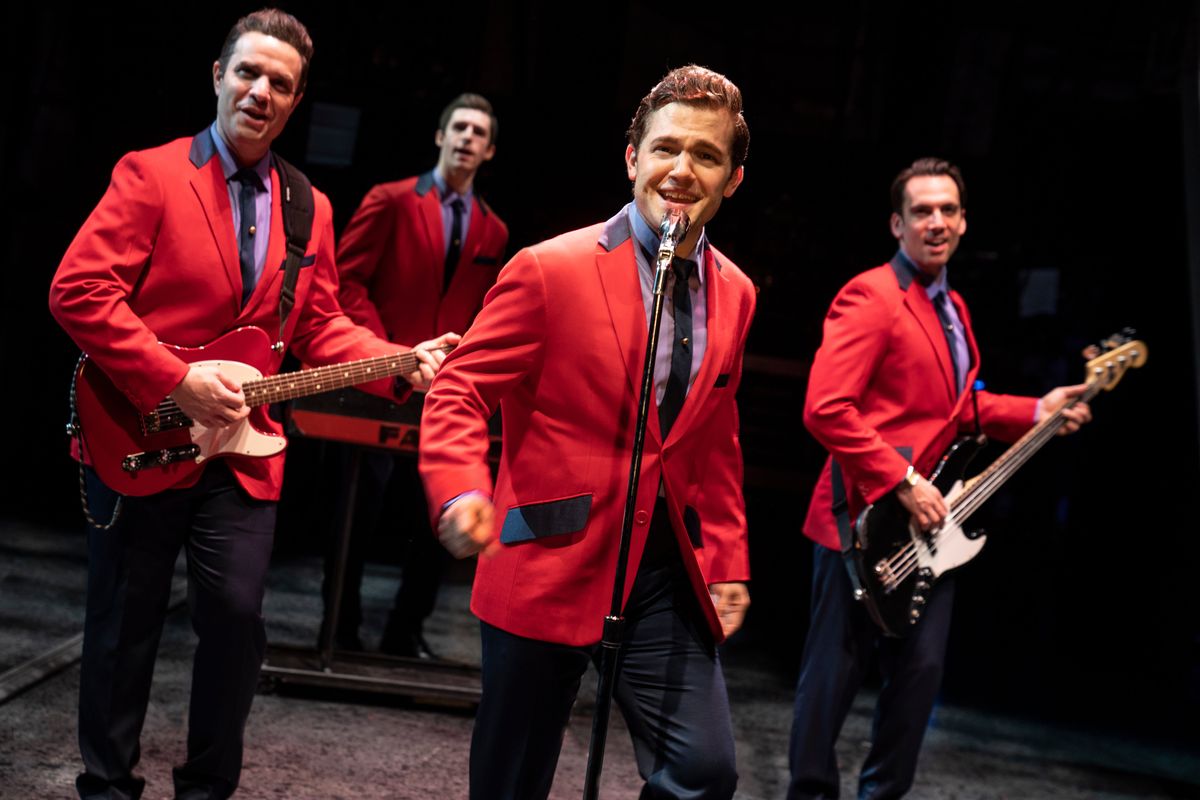‘Jersey Boys’ are back in town: Award-winning musical returns with its great music and rags-to-riches tale

The Four Seasons created some of the most memorable songs in American rock and roll.
“Sherry,” “Walk Like a Man,” “December, 1963 (Oh, What a Night)” and “Rag Doll.” Behind the soaring vocals of lead singer Frankie Valli, the Four Seasons sold more than 100 million records and were making hits into the disco years and beyond.
The band’s backstory is the stuff of Hollywood. They were blue-collar guys from Jersey, complete with criminal records and Mob connections. Still, Valli, guitarist Tommy DeVito and bassist Nick Massi worked hard at the music business, without a ton of success.
That all changed in 1959 when future actor and fellow Jersey boy Joe Pesci introduced them to his friend, singer-songwriter Bob Gaudio. Gaudio was a bit of a prodigy, having been a member of the Royal Teens and co-written the 1958 hit “Short Shorts” as a 15-year-old.
See? The stuff of Hollywood. Or Broadway, rather.
Gaudio teamed up with book writers Rick Elice and Marshall Brickman to create a musical biography of the Four Seasons. The result is “Jersey Boys,” which ran on Broadway for 12 years, won four Tony Awards (including for best musical) and returns to Spokane this weekend for a third run of shows.
Although he first saw “Jersey Boys” in Chicago not too long after it opened on Broadway, actor Eric Chambliss’ official relationship with the show dates back to 2018, when he was cast as Gaudio for the national tour. That gig came to a grinding halt in March 2020, of course, as did most live entertainment.
Chambliss is thrilled, he said, to be back on the road with much of the same company with whom he was performing in the before times.
“It’s special and unique, and it can’t be compared to other art forms,” Chambliss said of returning to live performance. “There’s nothing better than the collaboration between a company – the cast and crew – and the audience. It’s a pretty valuable connection.”
He’s met Gaudio once, during a tour stop in Atlantic City. It was a surreal experience, he said, but he found Gaudio to be kind and supportive.
“He’s a character I love playing,” Chambliss said. “He describes himself as the last piece of the puzzle, and that’s because he is the guy who comes in and is the creative guy that they’re missing. Aside from that, aside from being a talented musician and songwriter, he was also a savvy businessman.
“He learned some lessons early on touring with ‘Short Shorts,’ which was his first top chart hit. … So, he was ready to hit the ground running when he met his muse, which was Frankie. Each one of them contributed something quite vital to their meteoric success.”
Usually considered as one of the best of the so-called jukebox musicals – like “Beautiful” or “Mamma Mia” – the success and popularity of “Jersey Boys” continue unabated.
“There’s a lot of secret sauce to ‘Jersey Boys.’ It’s a very easy show to love, whether you’re in it or seeing it for the first time or the 20th time,” Chambliss said. “It’s a fantastic story, and the music is really a wonderful selling point.”
As the band’s sound transitions from the high falsetto of their breakout hit, 1962’s “Sherry,” to the more mature vocal style of “December, 1963” in 1975, it was clear that the Four Seasons refused to remained locked in one style.
“Frankie, Bob and Bob Crewe, Bob Gaudio’s writing partner, they were so very much on the pulse of what was popular and the changing landscape of music,” Chambliss said. “Their sound really did evolve throughout the decades.
“And to stay at the top of the charts for as many decades as they have, that’s what it takes. You have to be willing to evolve.”
The story is structured so that the perspectives of the different band members are reflected.
“It not only is fun and exciting and entertaining, it also is very real and grounded and relatable, and all of these stories are at least sourced from real people and real incidents,” Chambliss said. “It’s woven together beautifully.
“They’re working class guys, through a very colorful background … they scrap their way to put together this incredible group. Tommy DeVito says in the beginning of the show, ‘You can join the Army, you can get Mobbed up, or you can become a star.’ And that’s the way they saw the world.”